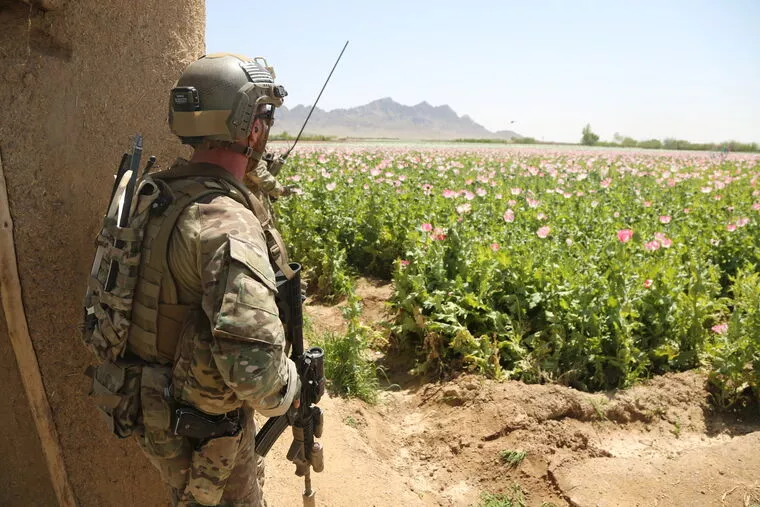A recent study by researchers from Ohio State University found that the benefits of psychedelic therapy included notably decreased symptoms of post-traumatic stress disorder, such as depression and anxiety, in U.S. Special Operations Forces (SOF) veterans.
Surprisingly, an analysis of patient charts revealed that psychedelic therapy involving one of two psychoactive drugs also markedly enhanced the SOF veteran’s cognitive functioning.
“The fact that we saw that there were improvements in cognitive functioning linked to brain injury were probably the most striking results, because that’s something we didn’t predict and it’s very new and novel in terms of how psychedelics might help in so many different domains,” lead author Dr. Alan Davis, associate professor and director of the Center for Psychedelic Drug Research and Education (CPDRE) in Ohio State’s College of Social Work, said in a press release.
Special Operations Forces are among the military’s most elite members, including groups like the Army’s “Green Berets” and Navy SEALS. They are trained for high-risk missions and unconventional warfare.
As some of the most highly skilled and best-trained military members, SOF troops can often experience a tumultuous career. With frequent deployments, extended durations away from family, and heightened exposure to intense combat situations, the potential for accumulating trauma and stress-related disorders is significantly amplified.
A 2021 study published in Military Medicine found that SOF personnel were more likely to suffer traumatic brain injuries than conventional military forces. In this recent study, nearly 90% of the SOF veteran participants reported sustaining at least one head injury during a combat deployment.
Because of the extreme physical and mental toll experienced by these elite warfighters, Dr. Davis and his colleagues say SOF veterans make for an intriguing group to examine the potential benefits of psychedelic therapy.
“What sets this group apart from some other veterans and civilians is that often, they are exposed to repeated traumatic events as a routine part of their jobs,” Dr. Davis explained. “This build-up of exposure to these difficulties seems to produce a cluster of challenges that include traumatic brain injury, which we know in and of itself predisposes people to mental health problems.”
For the study, researchers examined the clinical charts of 86 male SOF veterans seeking treatment at a facility in Mexico for an array of health-related concerns, including memory problems, brain injury, depression, anxiety, PTSD, sleep problems, anger, and fatigue.
The psychedelic therapy involved a combination of ibogaine hydrochloride, derived from the West African shrub iboga, and 5-MeO-DMT, a psychedelic substance secreted by the Colorado River toad. Both substances are currently considered Schedule I hallucinogenic drugs under the U.S. Controlled Substances Act.
The treatment regimen consisted of administering the psychedelics over two separate sessions, with patients reflecting on how they felt before and after each treatment.
Examining the patient’s post-treatment records, researchers found “significant and very large improvements in self-reported PTSD symptoms,” including depression, anxiety, and insomnia.
Moreover, psychedelic therapy led to a substantial rise in the veterans’ self-reported life satisfaction. Researchers noted that this significant improvement in SOF veterans’ quality of life continued to be evident up to six months after treatment. No data was collected beyond six months, so these improvements could extend even longer.
“This could have major implications for the landscape of mental health care if people are able to experience significant and sustained healing with 3 days of intensive treatment, relative to our traditionally available interventions that require 8–12 weeks of weekly therapy (e.g., gold standard talk therapies such as PE or CPT), or daily use of a pharmacotherapy such as an SSRI for months to years,” researchers wrote.
Most participants indicated positive shifts in attitudes, behaviors, and relationships post-treatment. During a one-month follow-up, researchers found that nearly 49% of participants described their psychedelic journey as the most spiritually profound moment of their lives. Additionally, 42.9% found it to be the most psychologically enlightening, while 17.1% considered it their life’s most challenging experience.
The most intriguing revelation from the study was the discovery that the SOF veterans had experienced “large increases in psychological flexibility and cognitive functioning” following psychedelic therapy.
The unforeseen discovery of cognitive improvement warrants further investigation and raises the question of whether the improvements in cognition stem from lowered mental health symptoms or are the result of biological changes in the brain induced by psychedelics.
“I think we’re seeing a similar picture emerging here where the more one is psychologically flexible, the more likely it is that one’s mental health symptoms will be reduced or ameliorated,” Dr. Davis said.
Researchers say they adopted a prudent approach to analyzing the data, factoring in the possibility that some participants who didn’t complete follow-ups might not have achieved the desired relief. Nevertheless, Dr. Davis says the overwhelmingly positive outcomes reported by SOF veterans with complex trauma histories vouch for the potential benefit of psychedelic therapy.
The results align with a string of similar research in recent years that has repeatedly found that the clinical use of psychedelics has tremendous potential for improving mental health and even promoting immediate and long-lasting increases in neural connections.
Ultimately, researchers believe the outcomes reported by SOF veterans demonstrate the importance of continued exploration, assessment, and understanding of the multifaceted benefits of psychedelic therapy.
The revelations concerning cognitive improvement also showcase the untapped potential benefits of psychedelic therapy in mental health treatment and pave the way for future studies in this realm.
The study, “Open-label study of consecutive ibogaine and 5-MeO-DMT assisted-therapy for trauma-exposed male Special Operations Forces Veterans: prospective data from a clinical program in Mexico,” was published in The American Journal of Drug and Alcohol Abuse.
Tim McMillan is a retired law enforcement executive, investigative reporter and co-founder of The Debrief. His writing covers defense, national security, and the Intelligence Community. You can follow Tim on Twitter: @LtTimMcMillan. Tim can be reached by email: tim@thedebrief.org or through encrypted email: LtTimMcMillan@protonmail.com

